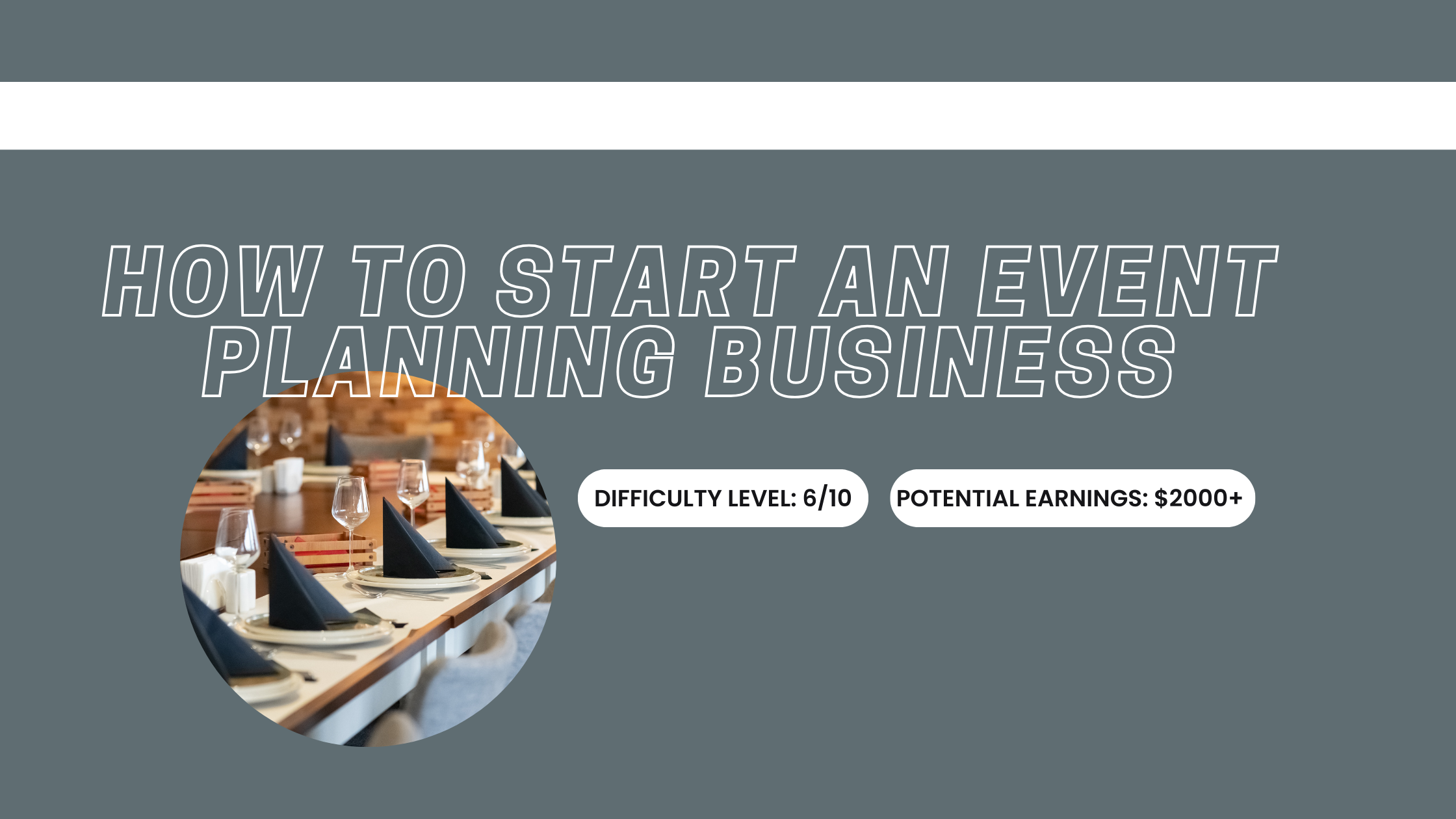How to Start an Event Planning Business
Time & Money
Difficulty
6/10
Weekly Time Commitment
15-30 hours
Earnings Per Month
$2,000 - $10,000+ (depends on event scale, client base, and location)
Is Starting Up An Event Planning Business The Right Move for Me?
Starting up an event planning business is a fantastic option for individuals with excellent organizational skills, creativity, and a passion for coordinating events. If you thrive under pressure, enjoy problem-solving, and love working with people, this could be a great fit for you. It’s ideal for someone who enjoys multitasking and managing details to bring everything together for a successful event. However, it’s not for those who dislike working under deadlines or who struggle with managing multiple tasks at once. If you’re someone who enjoys flexibility but can commit to hard work and tight schedules, then event planning might be the right gig for you.
Preparation: How to Start an Event Planning Business
Get started in event planning by understanding the dynamics of local events in your area. That includes doing comprehensive research on venues, vendors, and popular events near you. Good deals and lasting relationships are up for grabs if you're willing to network with local venues and suppliers. You should also decide what type of events you want to specialize in - whether that's weddings, corporate events or parties. A good business plan, a budget, and understanding marketing are fundamental to success in this industry. In addition, building a portfolio, whether through volunteering or organizing small events for friends and family, will give you credibility and help you gain clients.
Execution
Choose Your Niche
The most important first step in starting an event planning business is deciding what kind of events you want to plan. This can include weddings / corporate events / parties / conferences, or a range of the lot! Specializing in one niche lets you target your marketing more effectively and establish a name in the space. But if you are just getting started, you may want to offer different event types to diversify your income streams and gain experience in different areas.
Create a Business Plan
A business plan will help you structure your event planning business. This plan should outline your goals, services, target market, competition, and financial projections. Having a clear business plan will not only help you stay organized but also attract potential investors or clients. If you’re just starting out, consider offering packages or tiered pricing for different types of events to simplify your services. Be sure to also include marketing strategies and a timeline for growth.
Build Your Brand and Online Presence
You need a brand to succeed as an event planner. Create a name, logo and brand that represents the events you will put on. A web presence is just as important. Develop an attractive web site that promotes your portfolio, services and includes client reviews. Use social media like Instagram, Pinterest and Facebook to post event inspiration, behind the scenes content, and successful event stories. Potential clients will find and trust your online presence if you commit to a schedule and show reliability.
Network with Vendors and Venues
Event planning involves working together with vendors and venues. Ask local caterers, photographers, florists, entertainment companies & venues for help with this. Offer mutual referrals & partnerships where both parties stand to benefit. Your vendor network will help your events run smoothly and enable you to provide high quality services to your clients.
Create an Event Planning Process
Standardized processes for organizing events will help keep things clear and simple. Start with an initial consultation to understand your clients vision, needs and budget. From there, make a checklist with key planning items: venue selection, vendor selection, and invitation distribution. Set deadlines for each step to avoid last minute stress.
Develop Pricing and Packages
Establishing a clear pricing structure is essential for your business. You can charge hourly rates, flat fees, or offer packages depending on the type of event. Research the going rates in your area and adjust your pricing based on the scope of the event and your experience level. Offering packages that bundle services together can appeal to clients who are looking for a more straightforward and cost-effective option. Don’t forget to include additional fees for services like event rentals or extra hours of coordination.
Market Your Business
To attract clients, you need to market your event planning services. Start by offering discounts or free consultations to your first clients to build a client base and gain testimonials. Use social media platforms, blogs, and local business directories to get your name out there. Attending local networking events and expos is a great way to meet potential clients and connect with other vendors. Referrals from happy clients will also play a significant role in growing your business.
Bumps In The Road
Dealing with Stressful Clients
In event planning, clients can be highly invested in the event, and sometimes become hard to please. Meeting client expectations is key - always communicate clearly & professionally. If you're dealing with a particularly stressful client, try to remain calm and find solutions instead of getting emotional. Setting clear boundaries and expectations early will also prevent misunderstandings later on.
Handling Last-Minute Changes
However organized you are, last-minute changes can happen - vendor cancellation, weather issues, or a client changing the event timeline. Keeping calm and adapting quickly are essential to pulling things together. Backup plans & good relationships with vendors will help you with these unexpected challenges.
Managing Multiple Events at Once
Growing your business means you may be managing several events at once. You might burnout if you don't take care of this. Hire assistants or outsource tasks to trusted vendors to keep things running smoothly. It's also worth tracking events and deadlines with calendars, checklists and project management tools. Proper planning and delegation will avoid stress and ensure that your event runs like a well oiled machine.
Final Thoughts
Starting up an event planning business is sure to be a challenge, but the rewards are great. If you are passionate about putting on a show, and creating a space in which people can have a good time and let their hair down, this could be a great opportunity for you to look into. So what are you waiting for? Time to put that next great event on in your local area!
Continue Learning

At Home Travel Agent
A guide on how to become a travel agent while working from home, including tips on time management and how to get your first customers
